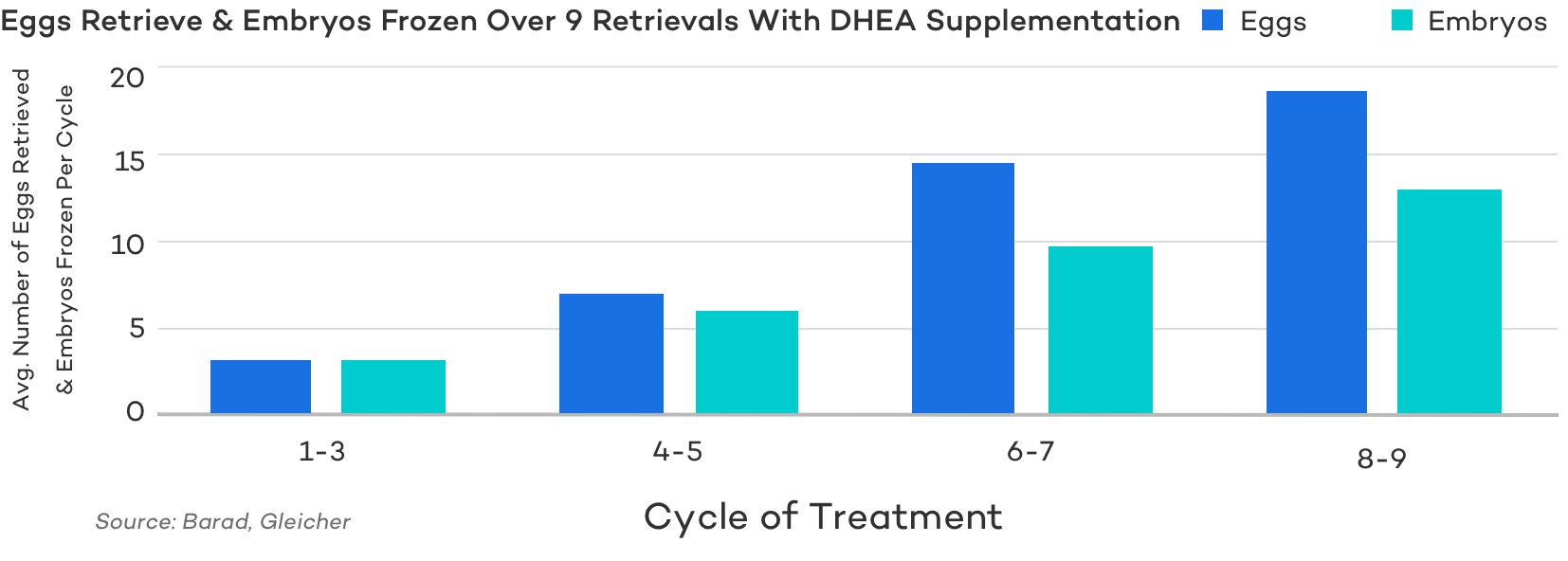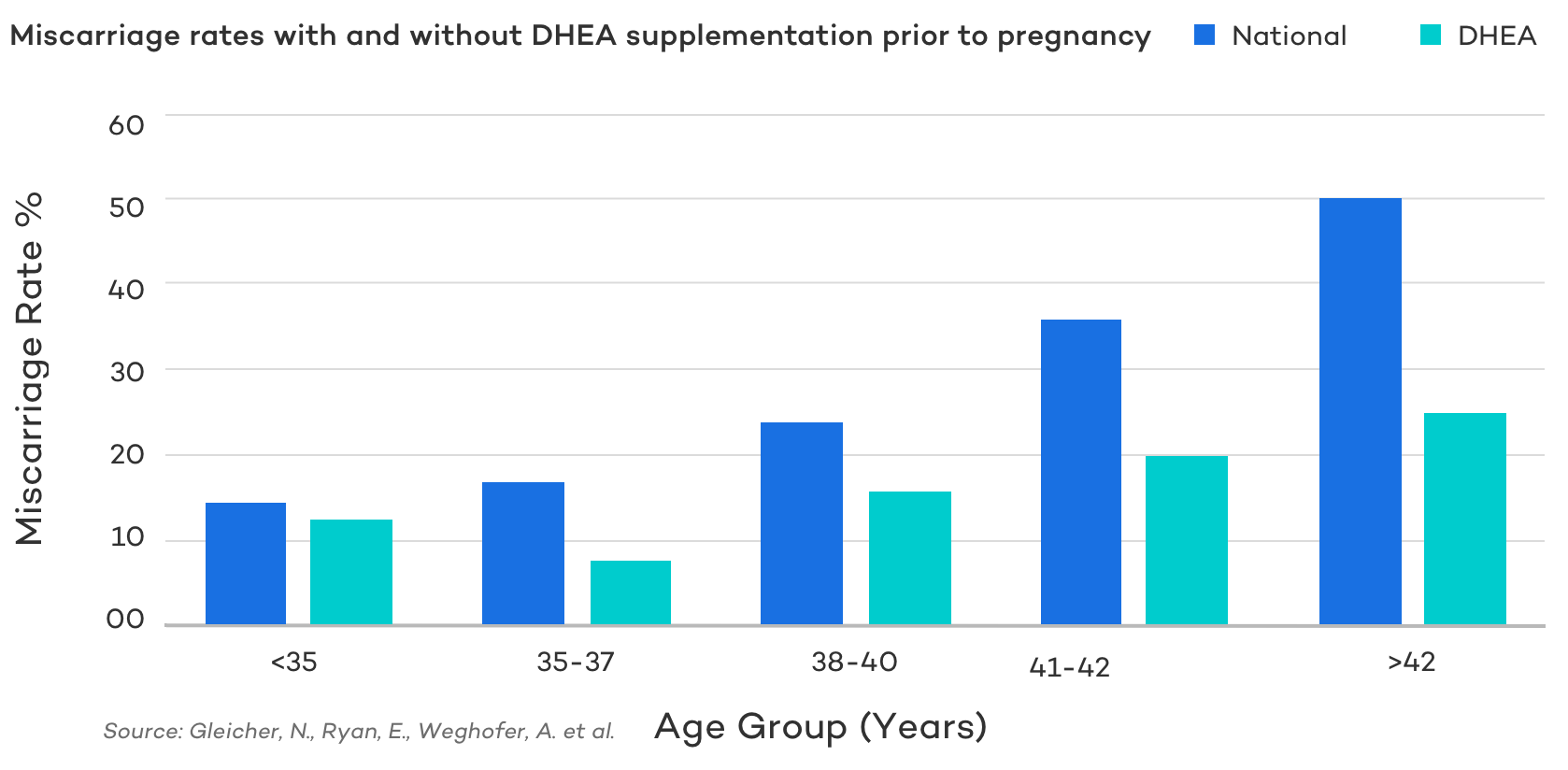DHEA for Fertility

DHEA (dehydroepiandrosterone) is a hormone that is naturally produced and secreted by the adrenal glands (and, to a minor extent, the ovaries and testes) in both men and women. It is a precursor for many other hormones of reproductive significance, including testosterone (which surprisingly plays a very important role in female fertility).
Unfortunately, the body’s ability to synthesize DHEA declines with age. Levels peak from age 20-30 and then decline at an average rate of 2% per year thereafter. Through the course of adulthood, DHEA levels may decrease as much as 80%, with significant declines already realized in many by age 40, if not earlier.
Because DHEA supplementation has been shown in some studies to support egg quality (reduce aneuploidy in embryos), increase the number of eggs that reach maturity each month, increase pregnancy rates, and reduce the odds of pregnancy loss, DHEA supplementation for fertility has become a topic of supreme interest for those trying to get pregnant.
In this article, we will review what DHEA is, how it improves fertility, who should take it, potential side effects, common dosages, and more.
Fast Facts on DHEA for Fertility
- DHEA is a precursor hormone for many male and female reproductive hormones.
- DHEA levels naturally decline as we age.
- Supplementing with DHEA increases egg quality and pregnancy rates for those trying to conceive.
- DHEA supplementation has been shown to reduce the odds of pregnancy loss in those who supplemented with DHEA before pregnancy.
- DHEA is often recommended for women with Diminished Ovarian Reserve (DOR). DOR is commonly experienced due to age (being over 40) but can be experienced in much younger populations with Primary Ovarian Insufficiency/Premature Ovarian Failure.
- The effects of supplementing with DHEA compound over time. While it begins to take effect after 1-2 months, it reaches its peak effectiveness after 4-5 months of continuous use.
- The standard dosage of DHEA for fertility is 25 mg 3 times a day for a total of 75 mg per day.
-
Side effects at 75 mg per day are minimal and rare.
How DHEA Improves Fertility
While the exact mechanism by which DHEA is not yet fully understood, the leading theory is that supplementing with DHEA enhances fertility by improving the hormonal environment within the ovary. That way, when eggs are recruited for development, they grow in a more optimal environment for producing higher quality eggs. To understand fully why this works, let’s take a step back.
It is important to remember that a female is born with all the eggs they will ever have (albeit in an immature stage). Each month approximately 1000 eggs are recruited from this waiting pool of immature eggs and start to develop with the “hopes” of being the one egg that is “chosen” for ovulation and subsequently fertilized.
It has long been assumed that all eggs, even those in the waiting pool, degrade as a woman ages. By the time a woman is 40, these eggs have degraded quite a bit so when they are recruited to begin their final stages of maturation they are already of very poor quality. However, reproductive endocrinologists now believe that the immature eggs stuck in the waiting pool remain in excellent condition. They end up being poor quality by the time ovulation occurs because they enter a poor ovarian environment for development.
What exactly constitutes a poor ovarian environment? Well, there are many potential answers to that question, but those with Diminished Ovarian Reserve (those who generally see the most benefit from taking DHEA) happen to have lower DHEA and Testosterone levels compared to a fertile population. While it is generally assumed that testosterone, a “male” hormone plays no role in the female body, testosterone is not only present in females but is crucially important in the ovary during the early stages of egg maturation.
As you might expect, when you take DHEA as a supplement, its levels (along with levels of testosterone and estrogen) increase. So, when DHEA is supplemented in someone with DOR, newly recruited eggs enter an ovarian environment with suitable levels of DHEA and testosterone for proper egg development.
Proper egg development then leads to:
- improved ovarian response (aka more eggs)
- higher pregnancy rates
- lower miscarriage rates
Below we will explore these in detail.
DHEA and Ovarian Reserve/Response
One early study that shined a light on the true potential of DHEA for fertility was a case study that followed one individual that showed progressive improvement in egg quantity and quality over time .

Despite being a case study of a single individual, the results here are truly noteworthy, and other studies of a larger nature have demonstrated similar findings.
DHEA Supplementation and Pregnancy Rates
Studies show that DHEA has the ability to improve egg and embryo quality in those with Diminished Ovarian Reserve. Therefore, it is no surprise that many studies have further shown that DHEA supplementation improves pregnancy rates. [referencesPending link=”Dehydroepiandrosterone (DHEA) supplementation improves in vitro fertilization outcomes of poor ovarian responders, especially in women with low serum concentration of DHEA-S: a retrospective cohort study” text=”Dehydroepiandrosterone (DHEA) supplementation improves in vitro fertilization outcomes of poor ovarian responders, especially in women with low serum concentration of DHEA-S: a retrospective cohort study “/] One of those studies found a pregnancy rate of 24% for those supplementing with DHEA and only 4% for those without and the other study (depicted below) found a pregnancy rate of 25% and 7% respectively.

DHEA Supplementation Effect on Miscarriage Rates
Numerous studies have shown DHEA supplementation prior to pregnancy can reduce the odds of miscarriage once pregnancy is achieved.
DHEA has this effect by reducing the number of eggs with genetic defects. Aneuploidy, AKA genetic abnormalities/mutations in embryos are the leading cause of pregnancy loss. One study that is relatively characteristic of others conducted shows a substantial decrease in miscarriage rates when individuals supplement with DHEA prior to pregnancy. In individuals over 41, the odds of pregnancy loss are halved. While this is substantial in and of itself, what’s even more impressive is that the national data comprises of all pregnancies and the DHEA group is those who specifically had Diminished ovarian reserve and are naturally subject to higher rates of pregnancy loss than a general population.

Summary of how DHEA works for Fertility
- Women with Diminished Ovarian Reserve (DOR) benefit the most from taking DHEA.
- Those with DOR have lower levels of DHEA and Testosterone.
- Testosterone is critically important for the early stages of egg maturation.
- Supplementing with DHEA increases Testosterone levels within the Ovary.
- Newly recruited eggs now develop inside a “hormonally youthful” and healthy ovary and thus develop normally at higher rates.
- Normal, healthy ovaries and eggs lead to a better ovarian response, improved egg quality, higher pregnancy rates, and lower miscarriage rates.
Who Should Take DHEA for Fertility
The consensus on who benefits from taking DHEA has changed over time. Initially, only women who had previously failed at least one IVF cycle and were over 42 were targeted as candidates for supplementation. By 2005, the consensus changed, and DHEA was suggested for all women above 40 who had failed an IVF cycle and displayed evidence of poor ovarian reserve. By 2006, it was determined that women under the age of 40 also benefited if they had elevated FSH levels (above 10 mIU/ml) and had at least one failed IVF cycle.
Currently, most fertility clinics recommend all women over 40 trying to get pregnant and younger women if they have DOR/POF (characterized by high FSH levels and or low AMH levels).
When To Take DHEA Summary
| Age | FSH (tested on day 2-4 of cycle) | AMH (tested any day of cycle) |
| 40+ | FSH > 10 mlU/mL | AMH <1.0 ng/mL |
At CNY, we generally classify high FSH as over 10 and low AMH as under 1. In most cases, we recommend DHEA for anyone who hits 1 or more of these targets. Women with PCOS are a general exception to this rule and usually should not take DHEA as they often have elevated levels of testosterone naturally.
DHEA for Fertility Dosage
The generally recommended dose for using DHEA for fertility is 75 mg of Micronized DHEA daily (though morbidly obese may find 100 mg more suitable). Ideally, this 75 mg is split into three 25 mg doses. This keeps a constant and steady supply in the body and helps avoid an upset stomach which can sometimes accompany oral DHEA supplementation. This dosage is set as the standard as it has generally been shown to provide adequate blood level changes of DHEA and testosterone in clinical studies.
How Long does DHEA take to Work for Fertility?
One should aim for at least 6-8 weeks of DHEA supplementation prior to a fertility treatment cycle. That said, the effects of DHEA increase over time and reach their peak after approximately 4-5 months. DHEA supplementation should generally be continued past 4-5 months until pregnancy is achieved.
DHEA Supplementation Side Effects
There are a few potential side effects of females supplementing with DHEA for fertility that one should be aware of before taking the hormone-based supplement.
Positive “Side Effects”
- improved vitality
- improved sex drive, libido, and general sexual health
Negative “Side Effects”
- Acne and oily skin
- Hair loss
- Upset stomach
- High blood pressure
- Changes in menstrual cycle
- Facial hair
- Fatigue
- Nasal congestion
- Headache
- Insomnia
While most of the negative side effects are very rare at doses under 100mg/day, they are important to keep in mind. It is also important to know that most the side effects are quickly reversed simply by lowering the DHEA dosage or stopping supplementation altogether.
Interactions and possible contraindications
As mentioned, small portions of DHEA are converted into estrogen, and as such, estrogen levels are likely to increase. If increased levels of estrogen are a problem (as they are in certain types of breast cancers), one should not use DHEA. Similarly, some people, like those with PCOS, already have high levels of DHEA and should not supplement with DHEA unless otherwise specified by their healthcare provider. As with all supplements, there could be other interactions and contraindications, so it is advisable to consult with your healthcare provider before taking DHEA.
Outlook
DHEA is a hormone that has been studied extensively as a dietary supplement and has repeatedly been shown to improve fertility outcomes. Along with diet, DHEA is a critical part of improving egg quality after 40 and for anyone with a Diminished Ovarian Reserve. If you fit into one of these populations, supplementing with DHEA and CoQ10 prior to pregnancy may be one of the best things you can do to increase your fertility and overall odds of pregnancy.


